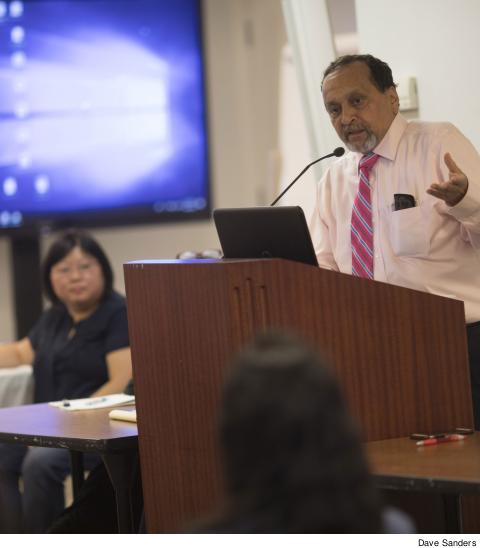Pushing anti-bullying bill
 |
Constant belittling, being ignored at meetings, repeated removing of work responsibilities without cause – all are forms of workplace bullying. Experts say that at least one in five workers has experienced bullying in the workplace, and that the incidents often go unreported. The PSC has repeatedly pressed CUNY administration to do something about this pervasive workplace problem, and, in the most recent round of contract negotiations, management agreed to take steps to address the issue.
“People deserve to go to work and be treated with dignity and respect,” said Iris DeLutro, a PSC bargaining team member and vice president of Cross-Campus Units. De Lutro has advocated for years for state legislation and a CUNY policy against bullying. “I hope there’s serious commitment [from CUNY management] to see how rampant this problem is and to provide remedies. We have to create safe spaces and training.”
CONTRACT RESULT
In final settlement talks on the PSC-CUNY 2017-23 contract, CUNY Chancellor Félix Matos Rodríguez agreed to a joint labor-management campaign to address workplace bullying.
PSC President Barbara Bowen commented, “I am hopeful about a campaign because a campaign will be public, and workplace bullying thrives on silence and shame.” Bowen continued, “The campaign has to involve equal commitments by labor and management, because creating a culture free of workplace bullying – especially under austerity conditions – will require an openness to change at every level. The preliminary conversations the PSC officers have had with management have been promising.”
The PSC, along with its parent union, NYSUT, is pressing for state legislation to address the issue. Earlier this semester, the HEO and CLT chapters organized a panel about workplace bullying and its effects. PSC members packed the union hall to address the issue and the steps that can be taken to eliminate bullying in the workplace. Panelists talked about the psychological effects of bullying and the way disinvestment in the university can foster bullying because employees are forced to do more work with less training and supervision.
“It is often the best and the brightest [who are bullied],” said Victoria O’Shea, an ASAP student advisor at Queensborough Community College. “Our supervisors don’t see how this bullying can affect the office.”
Bullying can lead to less commitment at work, decline in performance and the quality of work, and bullied employees seeking work elsewhere, she said.
BIG IMPACT
O’Shea said some of the psychological effects of bullying include depression, anxiety and panic attacks.
Graciano Matos, a laboratory hygiene officer at City College, said, “It’s hard to admit as an adult that you’ve been bullied.”
Matos, who worked in high-stress environments before he arrived in New York City, thought that once he started working in professional environments the constant lack of respect would stop. But it did not. He has done what he can in order to improve the situation, including working with the union on his case, but he said that people and organizations need to unite to create a shared policy.
LEGAL ACTION
O’Shea and Matos advised people in the audience to document instances of bullying when they occur, report any incidents to their supervisors and consult with a PSC grievance counselor immediately to find out if they can file a formal or informal complaint. (A grievance must be filed within 30 working days after an incident becomes known.)
If the bullying is directed at the victim because of race, sex, national origin, sexual orientation or disability, it could be harassment and a violation of state and city law. The Healthy Workplace Bill – which the PSC, NYSUT and other unions are supporting – is proposed state legislation that defines workplace bullying as including repeated verbal abuse or work sabotage that could cause physical or psychological harm.
If the bill passes and is signed into law, employees will have a chance to file a lawsuit against the alleged bully and could hold employers liable if reasonable preventative measures were not taken. With Democrats in control of both houses of the state legislature, unions like the PSC are hopeful about the bill’s prospects.
The law has its limits, though, said William Herbert, the executive director of the National Center for the Study of Collective Bargaining in Higher Education and the Professions at Hunter College. The only recourse is a lawsuit, he said, and many employees cannot afford to hire a lawyer. Herbert worked as a labor and employment lawyer for two decades, and, he said, unions need to consider representation for the victim and the alleged bully when devising a policy, because oftentimes both are union members.
Policies also need to include accountability measures and training components, otherwise they are ineffective, said Clara Wajngurt, a professor at Queensborough Community College who has studied bullying policies at other academic institutions.
“Bullying takes place over a period of time,” Wajngurt said. “[We need] to create a campus policy and communicate it clearly to staff and faculty so that [they] are all accountable for what [they] do.”
The continued lack of investment in public higher education creates an environment where bullying becomes more prevalent. Increased workloads, for example, create stressful working conditions.
TOP–DOWN ABUSE
“Managers are passing more of the work down as they get more work from above,” said PSC Legislative Representative Mike Fabricant. “Bullying has always existed and it has increased with the working conditions we are experiencing at CUNY.”
Many panelists stressed the importance of speaking out when one of their coworkers is being bullied and communicating that the behavior is unacceptable.
“The law will not change behavior immediately. It comes down to how we behave,” said Herbert. “[It’s about] building a union and developing a sense of solidarity and sense of unity.”

